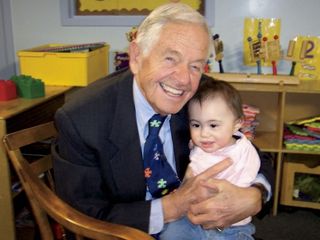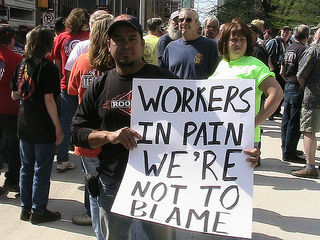Thursday, September 29, 2016
I Have House Mice...Maybe Rats
I have a mouse problem, maybe a rat problem. In my house. A problem that I can't seem to make go away. I tell the tale in my PsychologyToday.com article today.
Labels:
exterminating mice,
exterminating rats,
house mice,
house rats
Wednesday, September 28, 2016
On the Envelope: Musing on the mundane
In my PsychologyToday.com article today, I write a brief meditation on the lowly envelope.
Labels:
envelope,
gratitude,
simple pleasures
Tuesday, September 27, 2016
The Purpose of Marriage
A popular quotation from Stanford psychology professor Carol Dweck is:
"The whole point of marriage is to encourage your partner’s development and have them encourage yours."
Indeed, a Google search found that quote cited 523 times.
I raise questions about that in my PsychologyToday.com article today.
Labels:
marriage
Monday, September 26, 2016
The Burdens of Intelligence
Being intelligent has downsides, which can be mitigated. I explore those in my PsychologyToday.com article today.
Labels:
intelligence
An Ode to Readers of How-To Articles
The how-to article is considered a lowly form of writing. I consider it much underrated as are people who seek education, training, and edification from them.
Thus, in PsychologyToday.com, I wrote a an ode to the reader of how-to articles.
Thus, in PsychologyToday.com, I wrote a an ode to the reader of how-to articles.
On Autumn and Fall, Life's Last Smile
A few days ago, we entered autumn or fall. The word, "autumn" implies
hope, the endless cycle of renewal in which autumn is a necessary
prerequisite to spring. In contrast, the word "fall" implies
unidirectionality...downward.
"Fall," alas, more accurately describes the final quarter of our life, the metaphor often invoked for our descent into decrepitude and extinction. William Cullen Bryant called fall, "the year's last, loveliest smile." Is it not life's last smile?
How can we cope with thoughts of death and, worse, with the dying process, which lyricist Johnny Mercer, in the song, Autumn Leaves, called, "hearing winter's song?"
I address that in my PsychologyToday.com article today.
"Fall," alas, more accurately describes the final quarter of our life, the metaphor often invoked for our descent into decrepitude and extinction. William Cullen Bryant called fall, "the year's last, loveliest smile." Is it not life's last smile?
How can we cope with thoughts of death and, worse, with the dying process, which lyricist Johnny Mercer, in the song, Autumn Leaves, called, "hearing winter's song?"
I address that in my PsychologyToday.com article today.
Labels:
aging,
dying,
fear of death,
fear of dying
Is "The Pursuit of Happiness" Overrated?
 Psychologist and philosopher Alison Gopnik questions the wisdom of "the pursuit of happiness?" I lay out her case and my response in my PsychologyToday.com article today.
Psychologist and philosopher Alison Gopnik questions the wisdom of "the pursuit of happiness?" I lay out her case and my response in my PsychologyToday.com article today.
Labels:
meaning of life,
pursuit of happiness
Thursday, September 22, 2016
A Better Goal for Mark Zuckerberg's $3 Billion: A Super-Intelligence Pill
Everyone is falling over themselves to praise Facebook's Mark Zuckerberg for giving $3 billion in the attempt to cure all disease by the year 2100.
In my PsychologyToday.com article today, I argue it would be wiser for him to fund research that would develop a super-intelligence pill.
In my PsychologyToday.com article today, I argue it would be wiser for him to fund research that would develop a super-intelligence pill.
Wednesday, September 21, 2016
Changing Someone's Mind
The American Psychological Association ranked Leon Festinger the 5th most influential psychologist of the 20th century.
I was taken by his quote, "A person with conviction is a hard person to change. Tell him you disagree and he turns away. Show her facts or figures and she questions your sources. Appeal to logic and he fails to see your point."
Changing anyone is difficult but there are mitigators. I list five in my PsychologyToday.com article today.
I was taken by his quote, "A person with conviction is a hard person to change. Tell him you disagree and he turns away. Show her facts or figures and she questions your sources. Appeal to logic and he fails to see your point."
Changing anyone is difficult but there are mitigators. I list five in my PsychologyToday.com article today.
Labels:
attitude change,
communication skills,
influence
Tuesday, September 20, 2016
The Gig Economy: Is that trend good? An internal debate
In the past 50 years, the U.S. workforce grew by 100% but by 300% in the number of part-time/temp/contract workers who want to work full-time.
In my PsychologyToday.com article today, I offer an internal debate on whether our trend toward a gig economy is a net positive.
In my PsychologyToday.com article today, I offer an internal debate on whether our trend toward a gig economy is a net positive.
Labels:
gig economy
Monday, September 19, 2016
How to Give Advice That Will Be Accepted
We're all warned not to give advice. Yet even unasked-for advice can be helpful and embraced if worded appropriately.
In my PsychologyToday.com article today, I offer templates for framing advice-giving.
In my PsychologyToday.com article today, I offer templates for framing advice-giving.
Labels:
giving advice,
making recommendations
Sunday, September 18, 2016
Hedonism vs "Workaholism": A debate
For most people, including the Framers, core to the life well-led is "the pursuit of happiness."
Career corollaries include: "Make work fun," "Prioritize work-life balance," and "Do what you love and you'll never work a day in your life."
Outside-of-work corollaries include: "Life's short. East dessert first," "He who dies with the most toys wins," and "Par-tay!"
Yet some people believe the life well-led is mainly about being productive and contributing, that time spent frivolously could be better spent.
Perhaps the debate I posted on PsychologyToday.com today will help you gain clarity on whether you want to move somewhere new on the hedonist to work-centered continuum.
Career corollaries include: "Make work fun," "Prioritize work-life balance," and "Do what you love and you'll never work a day in your life."
Outside-of-work corollaries include: "Life's short. East dessert first," "He who dies with the most toys wins," and "Par-tay!"
Yet some people believe the life well-led is mainly about being productive and contributing, that time spent frivolously could be better spent.
Perhaps the debate I posted on PsychologyToday.com today will help you gain clarity on whether you want to move somewhere new on the hedonist to work-centered continuum.
Labels:
hedonism,
workaholic,
workaholism
Saturday, September 17, 2016
On Meeting the Intended
We typically think of birth, marriage, and death as life’s signal events. There’s a less-considered one: when parents meet their child’s intended spouse.
In my PsychologyToday.com article today, I offer the thoughts that might then race through that parent's mind .
In my PsychologyToday.com article today, I offer the thoughts that might then race through that parent's mind .
Unspeakables: What might you say to a mirror that you couldn't say to a person?
In my PsychologyToday.com article today, I show you an exercise you might find enlightening as well as raise a most difficult subject.
Labels:
right to die,
self-reflection
Thursday, September 15, 2016
On the Personal Essay: An interview with Phillip Lopate
A mark of good writers, whether fiction, essay, or poetry, is the
ability to unflinchingly illuminate the emotional issues that people
often try to suppress.
A prime exemplar is Phillip Lopate, long acclaimed as a writer of the widest range: from film reviews to poetry, novels to, most of all, personal essays.
Lopate is a member of the American Academy of Arts and Sciences, been a judge for the Pulitzer Prize, and is Professor and Director of the nonfiction writing program at Columbia University. He is my latest The Eminents interview in Psychology Today.
A prime exemplar is Phillip Lopate, long acclaimed as a writer of the widest range: from film reviews to poetry, novels to, most of all, personal essays.
Lopate is a member of the American Academy of Arts and Sciences, been a judge for the Pulitzer Prize, and is Professor and Director of the nonfiction writing program at Columbia University. He is my latest The Eminents interview in Psychology Today.
Labels:
personal essay,
Phillip Lopate,
workaholic
Parenting That Made Me Cringe
 A parent sitting near me at a restaurant made me cringe. It was her parenting. I tell the tale in my PsychologyToday.com article today.
A parent sitting near me at a restaurant made me cringe. It was her parenting. I tell the tale in my PsychologyToday.com article today.
Labels:
corporal punishment,
force feeding,
parenting
Tuesday, September 13, 2016
Training Smart
Next to hiring, training staff may be a manager or leader's most important task. In my PsychologyToday.com article today, I offer thoughts on how to do it wisely
Labels:
employee training,
training
Monday, September 12, 2016
When A Parent Wants to Keep His Child From Paying the Price for Screwing Up
A caller to my radio show yesterday said that his son did something so bad when he was 13 that now, four years later, it's still grounds for automatic disqualification from admission to the Army. He'd love to enlist in the Army.
His father called asking for my advice on how to get the Army to make an exception. I don't think I told him what he wanted to hear. My PsychologyToday.com article today consists of an augmented transcript of our exchange.
His father called asking for my advice on how to get the Army to make an exception. I don't think I told him what he wanted to hear. My PsychologyToday.com article today consists of an augmented transcript of our exchange.
Labels:
accountability,
excuse-making,
responsibility
Sunday, September 11, 2016
On Being Practical: An underrated way to live.
The word "practical" has kind of gotten a bad name, implying a
certain dourness, a life lacking in purple. We tend to more admire life
writ-large: the risk-taker, the idealist, the artiste.
Yet, with rare exceptions such as my irrationally exuberant doting over my sweet doggie Einstein, I've stubbornly remained practical in my career, writing, and personal life. I make the case for the boring, practical life in my PsychologyToday.com article today.
Yet, with rare exceptions such as my irrationally exuberant doting over my sweet doggie Einstein, I've stubbornly remained practical in my career, writing, and personal life. I make the case for the boring, practical life in my PsychologyToday.com article today.
Labels:
meaning of life,
practicality
Saturday, September 10, 2016
On Making Mistakes: Career, Relationships, Money, Health, Performing
A differentiator between successful and unsuccessful people is in
their preventing mistakes and in how they respond to mistakes they do
make.
In my PsychologyToday.com article today, I share thoughts on mistakes in career, relationships, money, health, and performing.
In my PsychologyToday.com article today, I share thoughts on mistakes in career, relationships, money, health, and performing.
Labels:
career advice,
financial advice,
performing advice,
resilience
Friday, September 9, 2016
Geneticists and Education Researchers Should Talk: Thoughts on a Robert Plomin quote.
Inexorably, we're learning that intelligence, okay, "reasoning and problem solving" are heavily affected by genes.
That doesn't imply that education is fruitless. It implies that geneticists and education researchers should work together to make the most of individuals' different genetics.
Preeminent behavioral geneticist Robert Plomin makes the case in my PsychologyToday.com article today.
That doesn't imply that education is fruitless. It implies that geneticists and education researchers should work together to make the most of individuals' different genetics.
Preeminent behavioral geneticist Robert Plomin makes the case in my PsychologyToday.com article today.
Thursday, September 8, 2016
The Experimental Parent. An interview with T. Berry Brazelton

He is Clinical Professor of Pediatrics Emeritus at Harvard Medical School and founder of The Brazelton Touchpoints Center at Boston Children’s Hospital. President Obama awarded him a Citizen's Medal. The Library Of Congress named him a "Living Legend. (He said, "It's better than the alternative.")
He is today's The Eminents interview in Psychology Today.
Labels:
Berry brazelton,
infant care,
parenting
Wednesday, September 7, 2016
Practical Ethics: An interview with Peter Singer

Consciously or not, we're always making ethical choices. Peter Singer argues that we often do so poorly.
Singer is Professor of Bioethics at Princeton. The New Yorker called him, the planet’s “most influential living philosopher. I interviewed him today in Psychology Today.
Labels:
effective altruism,
ethics
Tuesday, September 6, 2016
Are People a Minefield?
We can relax around some people even if they're veritable
strangers...but not with others. They're mines ready to explode if you
don't say what they want to hear.
In my PsychologyToday.com article today, I offer examples of the accelerating problem.
In my PsychologyToday.com article today, I offer examples of the accelerating problem.
Labels:
hypersensitivty,
safe spaces,
snowflakes,
trigger warnings
Monday, September 5, 2016
Beating The Odds: A commencement speech I may or may not get to give
A college
president invited me to lunch yesterday to discuss the possibility of my giving a
commencement address. We agreed that a good topic would be "Beating the Odds."
Labels:
career advice,
commencement speech
Sunday, September 4, 2016
Islands of Sanity: Escapes from the Maelstrom
 Many people seem busier and more stressed than ever.In my PsychologyToday.com article today , I list a number of careers and recreations that are escapes from the maelstrom.
Many people seem busier and more stressed than ever.In my PsychologyToday.com article today , I list a number of careers and recreations that are escapes from the maelstrom.
Labels:
relaxing activities,
relaxing careers
Saturday, September 3, 2016
Having Trouble Finding a Good Job? Keeping a Good Job?

You're not alone. Indeed, many of my clients, colleagues, and friends struggle and worry.
And many feel inferior. After all, every month, the media trumpets the federal government's press release it titles,: "The Employment Situation."That title implies it provides a comprehensive picture of American employment. Not exactly.
I explain why in my PsychologyToday.com article today.
Labels:
career success,
find a job,
finding a job
Friday, September 2, 2016
Musings on Using Animals in Medical Research
The American Psychological Association ranked Neal Miller the 8th most influential psychologist of the 20th century.
I had the privilege of being his research assistant at the Rockefeller University on the first research to prove that biofeedback worked.
In that research, we used a number of research animals, and animal rights activists attacked Miller for that. Here was his response:
I had the privilege of being his research assistant at the Rockefeller University on the first research to prove that biofeedback worked.
In that research, we used a number of research animals, and animal rights activists attacked Miller for that. Here was his response:
There is sacredness of all life. But where do we draw the line? That's the problem. Cats kill birds and mice. Dogs exploit other animals by killing and eating them. Humans have to draw the line somewhere in animal rights, or we're dead.I'm not sure that would convince vegans but perhaps the expansion of his argument that I wrote in PsychologyToday.com today might:
Labels:
animal research,
research animals
Thursday, September 1, 2016
Wise Words: 52 underused terms
In my PsychologyToday.com article today, I explain why each of 52 words should more often be used.
Subscribe to:
Comments (Atom)































